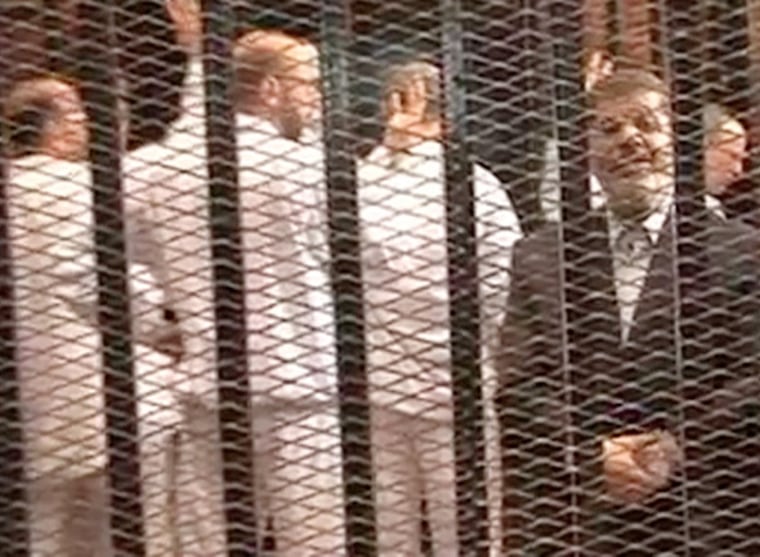
CAIRO - Ousted Egyptian leader Mohammed Morsi shouted "down with the military government" on the rowdy opening day of his trial on Monday, denouncing the court proceedings as “illegitimate.”
Morsi, an Islamist who was toppled by the army in July after mass protests against him, appeared angry and repeatedly interrupted the chaotic session.
Opponents of the country’s army-backed interim government say the trial is part of a campaign to crush Morsi's Muslim Brotherhood movement and revive a police state.
It is the second time in just over two years that an overthrown president has been in court in Egypt.
Morsi was brought out with other defendants in a courtroom at the Police Academy in a desert area on the edge of Cairo. He sat in a metal cage in the courtroom.
As soon as other defendants entered, Morsi began to shout: "Down with the military government! Egypt is a country and not a military base!"
The ousted president was wearing a dark suit, watch and tie and appeared healthy and composed in what was his first public appearance since the military overthrow.
Morsi and 14 other Islamists face charges of inciting violence relating to the deaths of about a dozen people in clashes outside the presidential palace in December after Morsi enraged his opponents with a decree expanding his powers. The defendants could face a life sentence or the death penalty if found guilty.
Morsi embraced other defendants several times and flashed a four-fingered pro-Brotherhood sign that has become the symbol of resistance in Egypt since July.
The judge tried to impose order, but Morsi said: "I'm Mohammed Morsi, the president of Egypt!"
Other defendants also began denouncing the court, forcing the judge to briefly suspend proceedings.
When the trial restarted, Morsi told the judge: “This is not a court, with respect to those who are in it. This is not a proper court to try a president. There's has been a coup, those responsible should be tried, I'm the president. I'm here by force and against my will."
As Morsi and other defendants shouted against the court and the coup, several pro-government journalists and lawyers were also shouting "Death," and "Execution.”
At one stage, a pro-government journalist took off his shoe and held it in the air, and there was pushing and shoving in the courtroom between pro-government and pro-Morsi supporters.
Throughout the proceedings, many of reporters smoked or climbed on chairs to get a better view.
Hundreds of Morsi supporters gathered outside the building to pledge their support for him. One sign read "The will of the people has been raped," a reference to the army takeover.
State television reported that the trial had been adjourned until Jan. 8, 2014.
Morsi would be transferred to the Tora Prison where the other Muslim Brotherhood defendants are being held, according to state television and a judicial source.
The now-banned Muslim Brotherhood has said it will not abandon the street protests it has staged to pressure the army to reinstate him, Reuters reported.
But a heavy security presence across the country served as a reminder of a crackdown in which hundreds of Morsi supporters were killed and thousands more rounded up.
The earlier 2011 uprising, which toppled Hosni Mubarak, had raised hopes that Egypt would embrace democracy and human rights and eventually enjoy economic prosperity.
Instead, the power struggle between the Brotherhood and the army-backed government has created more uncertainty in the U.S.-allied country of 85 million, which has a peace treaty with Israel and controls the Suez Canal.
NBC News’ Charlene Gubash in Cairo and Reuters contributed to this report.
Related: